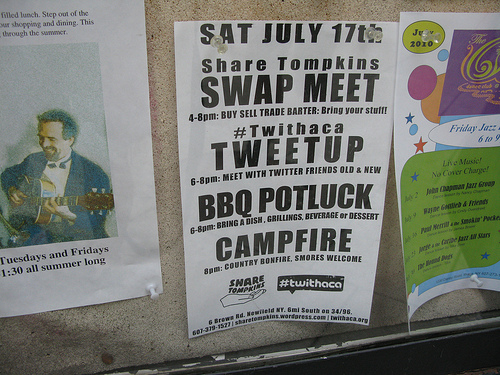5 Optional: The Barter Starter Legal Guide
When it comes to emphasizing the importance of barter in our economy, lately, I’ve been a walking example. Literally. My hiking boots need re-stitching around the seams, and while I’d love to get them repaired at the local shoe repair shop, that costs money. There is a shortage of money in circulation these days, and it’s especially hard to justify spending on things that don’t feel like absolute necessities.
On the other hand, if someone with skill would take an hour to repair my shoes, I’d happily take an hour to cook them a meal or provide legal services. The fact is that we are all surrounded by people who have both time and skills, and the traditional means of exchanging time and skills is money. Having a shortage of money shouldn’t mean our economy has to grind to a halt, or that my socks should get wet on a rainy hike.
Barter, time banks, and other forms of exchange can jump start our economy in new ways – ways that make more efficient use of underused skills and assets, that provide work opportunities for the underemployed, and that enable all of us to get our needs met.
When regular money is out of the picture, however, it can be hard to understand how the law applies to our economic transactions.
 Credit: Irina Slutsky
Credit: Irina Slutsky
Entering into a Barter Agreement
If you are bartering for services, for something of significant value, and/or for something that relates to your business, it’s a very good idea to get the arrangement in writing. The writing doesn’t have to be a formal contract; it could be sufficient just to have an email exchange where you discuss and agree to the details. People tell me stories of barter gone wrong, and I find that it typically arises from a lack of clear expectations about what people will do for each other. “I will tune up your car if you build my website” is not a sufficiently detailed agreement.
An agreement for barter should at least include:
- The timeframe for getting things done;
- A detailed description of what will be done or exchanged, the quality and scope of the work, and what constitutes a job well done;
- Whether there’s an upper limit of the number of hours each person will put in on the project;
- For tax purposes, what value will you assign for the services; and
- What happens if one person fulfills their end of the barter agreement, but the other person does not? How will the person who did their work be compensated for their time? In regular money, and, if so, how much?
 Credit: Shira Golding
Credit: Shira Golding
Paying Taxes on Barter
As I discussed in part one of this series, it’s not clear to me that the IRS wants to tax every exchange of goods or services, even though the rules do make it seem that way. The IRS doesn’t seem to concern itself with casual, non-commercial exchanges of goods or property, such as trading small favors with neighbors, taking turns driving in a carpool, exchanging babysitting with another family, and so on.
But when you barter for something that you could normally get money for, when you bargain for it at or near a market rate, when you are in the business of providing the good or service you are bartering with, or when you get something in a barter arrangement that would generally be counted as income had you received it in cash, then you should pay taxes on the value.
Determining Value
Determining the value of the barter income will be a challenge. According to the IRS, “if services are paid for in property [or in exchange for other services], the fair market value of the property [or services] taken in payment must be included in income as compensation.” Treas. Reg. § 1.61-2(d)(1).
Fair market value is a dollar amount that is based on what people in society at large are willing to pay for something. The irony and difficulty of this requirement is that many barter transactions take place outside of the marketplace, and the elements of generosity, cooperation, and community skew the price.
Another tricky piece of this is that we must overcome the law’s presumption that a barter transaction always entails trading two things of equal value. The law states that, “if the services are rendered at a stipulated price, such price will be presumed to be the fair market value of the compensation received in the absence of evidence to the contrary.” Treas. Reg. § 1.61-2(d)(1).
Here’s what that means: If a physical therapist typically charges $100 per hour, but agrees to provide therapy to someone in exchange for home-grown vegetables, it is unlikely that the stipulated price of $100 will be equaled by a modest bag of veggies. The physical therapist shouldn’t have to report $100 of income for each therapy session, but the law presumes that she should. What she can do is make a reasonable determination of the fair market value of the vegetables she receives, keep a written record of what she received and how she determined the value, then report that amount as income. That way, if she is ever audited, she has a record containing the required “evidence to the contrary.”

Fira d’Intercanvi de Mieres in France, where you have to barter for everything. Credit: Guy James
Reporting Barter Income
Usually, barter income should be reported on Schedule C, unless the value you have received is akin to a different category of income. For example, if you have received a good or service in lieu of receiving a rent payment, you report the value as rental income on Schedule E.
Don’t forget that when you report barter income, you can also deduct related business expenses. Thus, if an accountant provides $1000 worth of services to a web design business, and the web design business provides $1000 worth of services to the accountant, they each report $1000 of income, and deduct $1000 of business expenses (since accounting fees and web design fees are presumably businesses expenses for each). The net effect is that no taxes are paid.
You can also take into account the basis of property that you barter with. For example, if you barter your personal car for an electric bike worth $1000, it doesn’t mean that you will have $1000 of net income, since you probably paid more than $1000 for the car to begin with.
How and where to report, deduct, and adjust all of this on your tax returns is getting beyond the scope of what I can explain, and is more of a question for a tax accountant. If you plan to make barter a significant part of your economic activity, I’d recommend finding an accountant who is willing to learn the ins-and-outs of barter and help you sort out the details.
And Do Not Send Soup the IRS!
Another irony about the taxation of non-cash income is that the IRS expects you to pay the tax in cash. If the IRS considers 50 jars of soup to be income, why can’t we just send them 8 jars to fulfill our tax obligations? Unfortunately, we don’t have that option at this time, and it requires us to always keep at least a small foot in the cash-based economy.
Nevertheless, the idea of paying taxes in something other than cash is not an outrageous idea. As local currency expert Mira Luna has suggested, there should be a program that allows us to fulfill our tax liabilities by performing community service. It would be sort of like a time bank for paying taxes. In my hypothetical soup case described in part one of this series, since I receive almost no cash for my soup, I could put in a few hours a week volunteering at a nonprofit soup kitchen to satisfy my tax liability.
Barter Exchanges and Time Banks
Barter Exchanges
Barter can be a person-to-person transaction, or it brokered by a third party within a network of participants, through what the IRS calls a “barter exchange.” The new Green America Exchange is an example of a barter exchange, where members can offer their services and goods to other members, and receive “payment” in Exchange Dollars. Green America has, in essence, created a new currency; but because they are facilitating and administering the transactions, Green America Exchange is considered a barter exchange. As such, they are obligated to report the members’ barter income by filing form 1099-B.
Time Banks
It’s important to note that time banks are not considered barter exchanges. The IRS has declined to regulate time banks in the same way that they regulate barter exchanges, recognizing that time bank transactions are “informal exchange of similar services on a noncommercial basis and do not result in the creation of contractual rights and obligations among members” (Private Letter Ruling 9608009, November 9, 1995). Thus a time bank organization will generally not have to file a 1099-B for member transactions.
Time banks are unique in that one person’s hour is valued the same as someone else’s hour, so there is no market-based valuation of people’s services. In addition, people can spend time dollars, accumulate a negative account balance, and they are never legally obligated to “repay” them. It means that people who are in need can use a time bank to get assistance, without having to first accumulate a positive balance.
In this respect, time banks aren’t really facilitating barter; they are facilitating a culture of giving that could be an incredibly important tool for relieving poverty. If your community does not yet have a time bank, I’d recommend starting one!

Credit: dmott9
Caveats
This series is an attempt to give readers at least some sense of orientation in relatively unsettled or uncharted legal territories. When legal definitions are unsettled, the best that we can do is 1) gain as much understanding as we can, by reading laws, regulations, tax rulings, and court cases, and 2) based on that information, make good faith and reasonable determinations about how to classify our activities. Sometimes, you may get the answer wrong, which means dealing with the consequences when the IRS, Department of Labor, or other agencies come calling. It’s up to you to decide what risks are worth taking.
Please keep in mind that the information in this article is not legal advice. Legal information is not the same as legal advice, which is tailored to an individual’s specific circumstances and relies on the lawyer knowing all the relevant facts.



